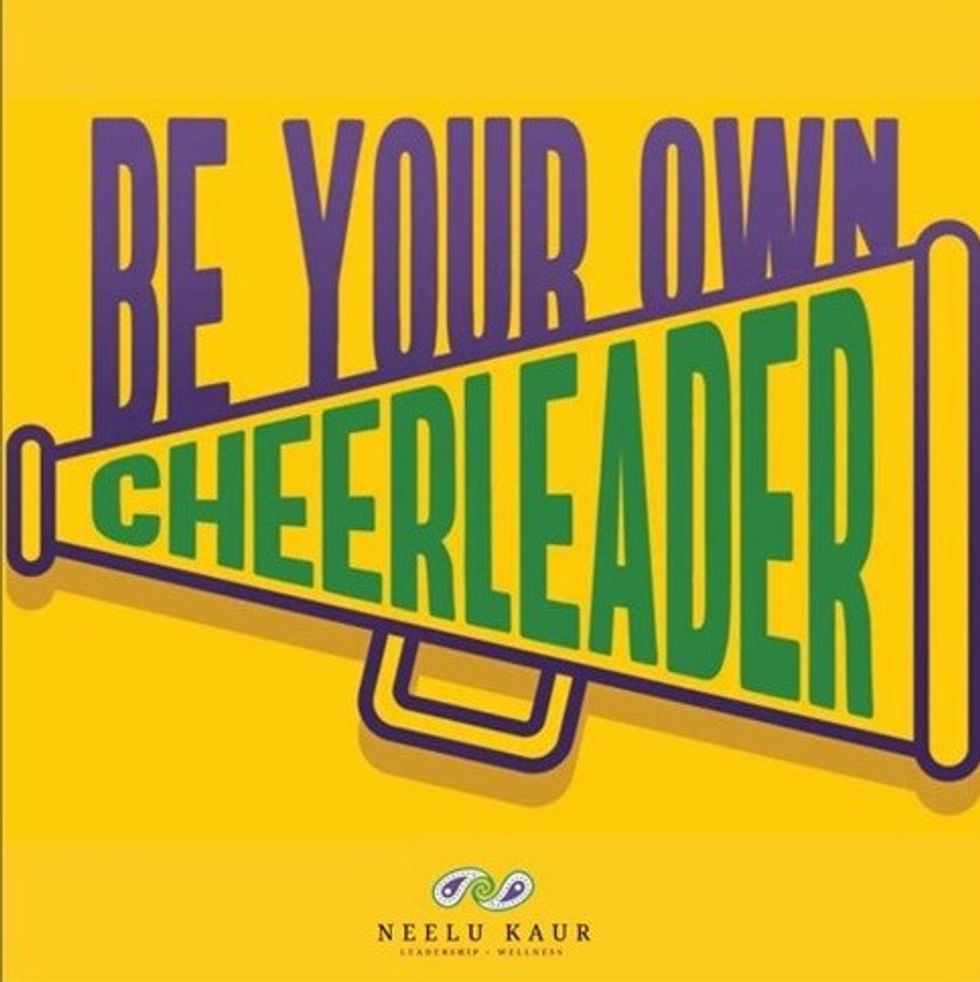Neelu Kaur is a facilitator, Neuro-Linguistic Programming (NLP) Executive Coach, and Burnout Management Specialist. She has fifteen years of experience specializing in adult learning and leadership development in large organizations ranging from financial services and consulting to the tech industry.
Putting all her expertise to work, Neelu has written a book called Be Your Own Cheerleader: An Asian and South Asian Woman’s Cultural, Psychological, and Spiritual Guide to Self-Promote at Work. This is reportedly the first book written to help professional Asian and South Asian women self-advocate in the North American workplace.
Be Your Own Cheerleader examines why it is difficult to toggle between Eastern and Western culture at work; what the 'recipe for disaster' is; what it means to be 'Raised in the We, Thrive in the I'; 10+ tips for speaking up. It also recounts the author’s personal experiences struggling and thriving as an Indian woman in corporate North America.
Neelu is also a certified yoga instructor, Ayurveda specialist, and an Ericksonian-trained hypnotherapist focused on bringing mindfulness and stress management practices to individuals, teams, and organizations.
In an exclusive interview with Eastern Eye she answers some of the questions her book examines and much more. Read on.
What inspired the idea for your book?
Self-advocacy and self-promotion have been challenging for me throughout my career. As an Indian born American raised South Asian, my folks come from a collective ‘we’ based culture. Self-promotion is something that is frowned upon in many Asian and South Asian collective cultures. The US is an individual culture, very much focused on the ‘I.’ This is especially true in corporate America.
Throughout my career, I noticed some folks were very comfortable speaking about their accomplishments. I felt boastful or shy to do this and it cost me many growth opportunities and promotions.
The pivotal moment when I realized I sucked at self-advocacy was when I was downsized in 2013, from a large financial services company. I was working there as a facilitator and coach and when I was escorted back to my desk to gather my belongings, I looked around and noticed those that were still in their seats were very skilled in tooting their own horn.
At that moment, I knew it was a skill I needed to cultivate. My book came many years later after realizing it was not just me that found this challenging but many other Asians, South Asians, and underrepresented voices.

How did you come up with the title of your book?
I wanted the title to be something that people could relate to and quickly understand what the book was about. The subtitle came after deciding on the three areas I was going to focus on, which are Culture, Psychological, and the Spiritual aspects of self-promotion. These areas are most resonate for me given my work in mental health and well-being.
Are there any books or authors that inspired you to become a writer?
I have wanted to be a writer since my earliest memories. It’s something I have always wanted to do, and I hope that ‘Be Your Own Cheerleader’ opens the door to many more. There are many books and authors that inspired me. I found most inspiration from spiritual books from Dr. Wayne Dyer, Abraham Hicks, Deepak Chopra, and Eckhart Tole…to name a few.
Please share some tips to help Asian and South Asian women to speak up.
There are many tips that I offer in my book and in the ‘Be Your Own Cheerleader’ workshop series. A couple that I think are easy to implement immediately: Turning up and down the ‘We’ and ‘I’ dial based on the situation. For example, if I am consulting to a team and we are brainstorming ideas, I turn up the ‘We’ dial where everything is focused on group efforts.
When on a business development call where I am selling my services, I need to speak about my accomplishments and credentials. This is where I turn up the ‘I’ dial. Given the situation you are in, you can now turn up or down the ‘We’ and ‘I’ dial, and dance harmoniously between the two worlds.
The other tip is something I like to call an ‘Interruption Shield,’ which are words or phrases used to jump back in a conversation if you have been silenced. The words or phrases must sound like something you feel comfortable saying. I often say, ‘If I may’, ‘May I,’ ‘Can we circle back to…xyz.’ These are phrases we practice over and over to feel more comfortable speaking up for ourselves and help build the self-advocacy muscle.
In the book you talk about 'uncomfortable with confrontation + Unable to speak up for myself + Consistently worried about the perception of others = HUGE fail in corporate America.' Please elaborate.
When you come from or are raised in a collective ‘We’ based culture, it is very difficult to speak up for yourself. It’s a skill we must learn and practice daily because it was not modelled for us.
What does it mean to be “Raised in the We, Thrive in the I?”
When you are raised in the collective ‘We’ based cultures (Asian & South Asian), it is very difficult to make a name and place for yourself in the individual ‘I’. Not only are you unskilled in advocating for yourself, but you are also unsure of how to be proud of your work or accomplishments. Asian and South Asian women are silent in situations where they need to use a bullhorn because they are unsure and lack the skills to speak up on their own behalf. They are often overlooked for promotion. Others take credit for their work, and over the years these scenarios pile up, causing imposter syndrome and resulting in a downward spiral of low self-efficacy.
To thrive in the ‘I’ would be to dance gracefully between the two cultures (east & west), and to celebrate and clearly articulate your individual accomplishments.
What do you have to say about the diminishing habit of reading?
I am observing more local bookstores popping up throughout New York City. I guess it depends on who you ask. As a continuing ed junkie, I enjoy audio books, reading high level synopsis when appropriate, so I don’t know if I fully agree with diminishing habits of reading. We can consume information in many ways; however, I don’t believe a physical hard copy of a book will ever go out of style.




